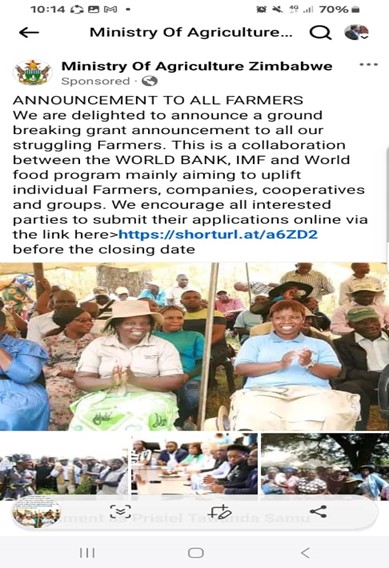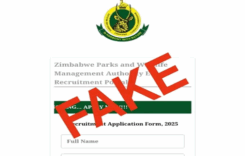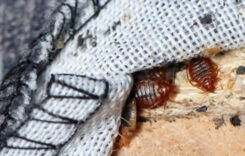Claim: A Facebook account operating as the Ministry of Agriculture Zimbabwe posted a notice calling on “struggling farmers” seeking financial support to apply for grants. The grants were said to be from a collaboration with the World Bank, International Monetary Fund and the World Food Programme.
Is this true or false?
Verdict: False
The Ministry of Lands, Agriculture, Fisheries, Water, and Rural Development has not posted any announcement concerning financial assistance for farmers to apply on its official platforms.
The above page has been flagged as a scam page, there are numerous red flags from the post that make it questionable.
Clues from the post
- Imposter Profile: The official Facebook page of the ministry is titled Ministry of Lands, Agriculture, Fisheries, Water, and Rural Development Zim instead of Ministry of Agriculture Zimbabwe.
- Obvious errors: The post has glaring formatting, punctuation and grammatical errors which are uncharacteristic for official communication. “This is a collaboration between the WORLD BANK, IMF and World food program mainly aiming to uplift individual Farmers, companies, cooperatives and groups.” The World Bank was written in capital letters, the International Monetary Fund (IMF) was written as an abbreviation, World Food Programme was written wrongly, and the improper use of between.
- Account history and missing detail: It is suspicious that the page was created on 24 May 2024 and does not have any contact details which include; the ministry’s physical addresses, website and phone numbers which is standard for official pages. It is also worth noting that the call for grants does not have a deadline.
How to verify social media accounts
- Find out who is posting on the platform.
- If it purports to be a ministry page, find out if it is the official account. It is usually linked to that particular ministry’s website or other social media platforms.
- Inspect the timeline to investigate whether the user has a track record of posting factual and reliable information.
- Try to understand the context within which a post was made.
- Verify date & time stamp.
- Check out the followers.
- Find out if the page was setup as a parody account to share jokes.
- Find out what other pages or media platforms say about the issues raised in the post.
- Lookout for obvious errors in the post.
- In some cases, one can get a clue in the comments section.
- Check if the URL in the post works.
Sources
Ministry of Lands, Agriculture, Fisheries, Water, and Rural Development
Related Content
Do you want to use our content? Click Here












